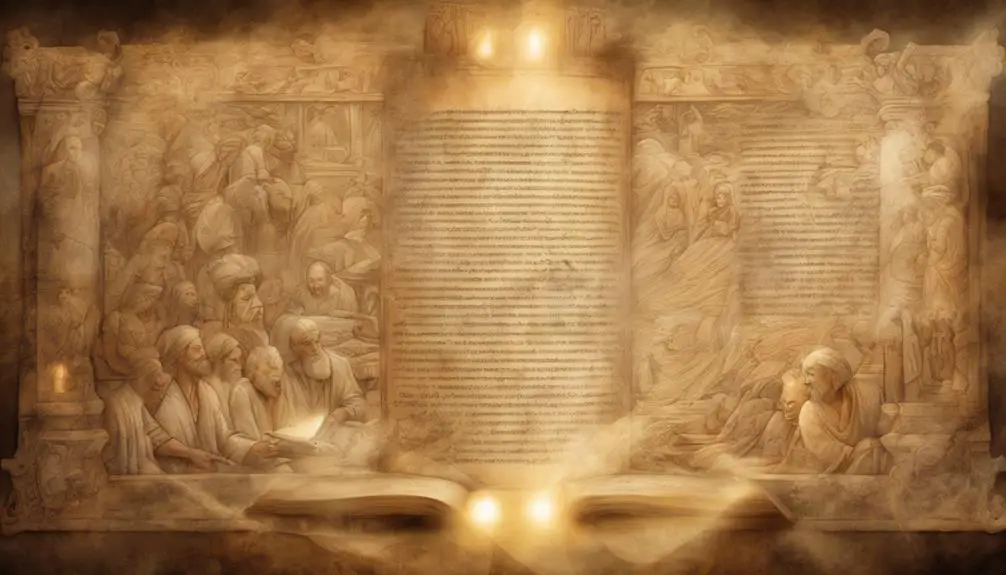Marvel at the profound significance of 'It Came to Pass' in biblical narratives, uncovering layers of meaning in ancient storytelling.

It Came to Pass in the Bible
As you flip through the ancient pages of the Bible, you might think 'it came to pass' was the ancient scribe's favorite way to assure you that, indeed, things happened. This phrase, sprinkled liberally throughout the text, isn't just a biblical way of saying 'and then.' Its origins, frequency, and the weight it carries in literary, theological, and historical contexts open up a fascinating discussion.
From its role in narrative transitions to its implications in prophecy and storytelling, understanding why this phrase was so pivotal could change how you view the biblical narrative. So, why has this phrase stood the test of time, and what secrets does it unlock about the nature of biblical storytelling? Let's explore together.
Key Takeaways
- 'It came to pass' is a transitional phrase originating from ancient Hebrew, frequently used in the Bible.
- The phrase emphasizes narrative rhythm and theological themes, such as divine intervention and prophecy.
- It serves as a stylistic tool, anchoring historical events and enhancing the Bible's literary identity.
- Translation and cultural relevance pose challenges, highlighting its importance in understanding biblical narratives and contexts.
Origins and Frequency

The phrase 'It came to pass,' a staple of biblical literature, originates from the ancient Hebrew text, appearing hundreds of times and offering insight into the narrative style and theological motifs of the time. You'll find that its frequency isn't just a matter of repetitive storytelling but a reflection of phrase evolution and the overarching narrative techniques employed by biblical authors. Through linguistic analysis, you can discern how this phrase, beyond its surface meaning, served as a transitional tool, guiding readers from one event to the next, while also imbuing the text with a sense of divine inevitability.
Delving deeper, you'll realize that the occurrence of 'It came to pass' isn't uniformly distributed across the biblical text. Its prevalence in certain books over others can provide you with a nuanced understanding of the various authors' intentions and the historical context in which they were writing. This phrase's evolution, from its Hebrew origins to its English translations, reveals shifts in linguistic preferences and theological emphasis, making it a fascinating study of how language and faith intertwine in sacred texts. Through this lens, you gain a richer appreciation of the Bible's literary and historical layers.
Literary Significance

Exploring further, you'll uncover that 'It came to pass' carries profound literary significance, weaving a tapestry of continuity and divine orchestration throughout the biblical narrative. This phrase isn't merely a transitional tool; it's a cornerstone that contributes to the Bible's unique literary identity. Here's how:
- Narrative Rhythm: It introduces a rhythm, a sort of heartbeat to the storytelling. Like a drummer keeping beat, 'It came to pass' signals the movement from one event to the next, guiding the reader through complex narratives with ease.
- Stylistic Consistency: Across various books, despite differing authors and contexts, this phrase maintains stylistic consistency. It's a thread that binds the diverse tapestry of texts into a cohesive whole.
- Historical Anchoring: By marking transitions, it also serves to anchor historical events within the larger narrative, providing a framework that helps readers place stories in a broader context.
- Literary Device: Beyond its functional role, it's a literary device that imbues the narrative with a sense of inevitability and divine oversight, subtly reinforcing themes of fate and prophecy.
In essence, 'It came to pass' isn't just a phrase but a powerful literary mechanism that enhances the biblical narrative's rhythm and stylistic consistency.
Theological Implications

Delving into 'It came to pass,' we often find its theological implications deeply embedded within the narrative, revealing how divine intervention shapes the unfolding of biblical events. This phrase isn't just a literary bridge; it's a theological signal, highlighting the role of Divine Providence in human history. It suggests that every event, no matter how trivial it seems, is part of a larger, divine plan, meticulously orchestrated by a higher power.
You'll notice that 'It came to pass' often precedes moments of significant change or fulfillment of prophecy, underscoring the notion that nothing happens outside God's will. This perspective encourages a deep trust in Divine Providence, reassuring believers that, despite life's unpredictability, there's a divine hand at work.
Furthermore, the phrase enriches eschatological perspectives by weaving a thread of hope through the narrative. It points toward the ultimate fulfillment of God's promises, offering a glimpse into the future when all will be brought to completion according to divine plan. From this standpoint, 'It came to pass' isn't merely a narrative transition; it's a theological affirmation of God's active involvement in the world and His unyielding commitment to His word.
Historical Contexts

While the theological implications of 'It came to pass' illuminate divine orchestration, understanding its historical contexts sheds light on how this phrase has been pivotal in narrating biblical events across ages.
Delving into the historical contexts, you'll find that:
- Cultural Influences: This phrase echoes the oral traditions of ancient societies. Its repetitive nature wasn't just a narrative tool but a means to engrain stories into the collective memory of a culture, ensuring their survival through generations. This method of storytelling reflects the importance of oral tradition in preserving history and moral lessons.
- Geographic Significance: The varied landscapes of the Bible, from deserts to bustling cities, serve as more than mere backdrops. They influence the events that 'came to pass,' shaping the narrative and the lives of its characters. The geographic diversity underscores the universality of the Bible's messages, transcending cultural and temporal boundaries.
- Socio-Political Contexts: The phrase also situates biblical events within specific socio-political realities. Understanding these contexts provides insights into the challenges and triumphs faced by biblical figures, making their stories resonate with historical authenticity.
- Linguistic Evolution: Its usage reflects the evolution of language and literary styles within the Bible, offering a glimpse into how storytelling adapted over centuries. This evolution marks the Bible not just as a religious text, but a historical document, rich with insights into ancient linguistics.
Analyzing these contexts, you gain a deeper appreciation for the phrase 'It came to pass,' recognizing its role in bridging divine narratives with human history.
Notable Examples

Let's examine some key instances where the phrase 'It came to pass' not only propels the narrative forward but also encapsulates significant biblical moments, offering a lens through which to view the unfolding of divine and human history. This phrase frequently precedes genealogical listings, serving as a bridge between eras and highlighting the continuity of God's people through generations. It underscores the meticulous record-keeping that was essential for establishing the legitimacy of lineage, particularly in the context of the Messiah's ancestry. This attention to detail in genealogical listings isn't merely for historical accuracy but also underscores the fulfillment of divine promises through specific lineages.
Moreover, 'It came to pass' heralds prophetic fulfillments, marking moments where divine prophecies intersect with human history. These instances are pivotal, as they validate the reliability of divine promises and the inevitability of their realization. Such moments aren't just historical markers but are also deeply symbolic, illustrating the faithfulness of God across ages. Through these narratives, the phrase becomes a testament to the unfolding of God's plan, reassuring the faithful of the certainty of His promises.
Modern Interpretations

In exploring the phrase 'It came to pass' within a contemporary context, scholars have unearthed a rich tapestry of interpretations that resonate with both modern believers and secular audiences alike. This exploration has unveiled the phrase's enduring cultural relevance and highlighted the ongoing translation challenges.
Cultural Relevance: You'll find that 'It came to pass' isn't just an archaic linguistic relic; it's a bridge to understanding the ebbs and flows of human experiences across ages. Its usage today evokes a sense of continuity and shared heritage, making ancient texts accessible and relatable.
Translation Challenges: The phrase presents unique difficulties in translation, as its meaning must be conveyed without losing the original's nuance. You're faced with the task of balancing fidelity to the source with the need for clarity and relevance in modern languages.
Interpretive Flexibility: It allows for a broad spectrum of interpretations, encouraging you to engage with the text on a personal level. This flexibility fosters a deeper, more meaningful connection to the material.
Pedagogical Value: For educators and scholars, 'It came to pass' serves as a valuable tool in teaching the complexities of linguistic evolution and cultural adaptation, highlighting the importance of context in understanding historical texts.
Frequently Asked Questions
How Does the Phrase "It Came to Pass" Psychologically Impact Readers of the Bible, and Does It Differ Across Cultures?
When you explore how phrases impact readers, you'll find 'it came to pass' offers psychological comfort, signaling eventual resolution. Its cultural resonance varies, deeply affecting those in societies valuing narrative closure.
For some, it reinforces faith in a predetermined plan, soothing anxieties about the unknown. Others might see it as a literary device, enriching the text's depth. Your interpretation hinges on cultural background and personal beliefs, highlighting its multifaceted influence.
Are There Any Musical Compositions or Artworks Inspired Specifically by the Phrase "It Came to Pass"?
You're exploring how the phrase 'it came to pass' has inspired musical compositions and artworks, delving into linguistic analysis and cultural perception.
This exploration reveals the profound impact of language on art and music, highlighting differences in interpretation and emotional resonance across cultures.
Your analysis shows that artists and composers have been moved by the phrase's narrative depth and temporal significance, weaving these themes into their works in ways that reflect their cultural backgrounds and personal insights.
How Do Children and Young Readers Interpret the Phrase "It Came to Pass" When They Encounter It in the Bible?
When you examine how children and young readers interpret 'it came to pass' in biblical texts, you're delving into language comprehension and storytelling techniques. They might view this phrase as a marker of progression or transition in a story, signaling a change or the fulfillment of an event.
Their understanding reflects their grasp of narrative structures, often seeing it as a bridge between events, highlighting its role in weaving the biblical narrative together.
Has the Phrase "It Came to Pass" Been Utilized in Any Major Advertising Campaigns or Popular Media Outside of Religious Contexts?
You might wonder if the phrase 'it came to pass' has been used in marketing strategies or popular media, beyond its religious roots.
Surprisingly, this phrase has found its way into various cultural references, blending historical depth with contemporary appeal.
Marketers have leveraged it to evoke a sense of inevitability or destiny, cleverly applying an ancient turn of phrase to modern products and campaigns, showcasing an insightful blend of tradition and innovation.
What Are the Differences in the Translation of "It Came to Pass" in Contemporary Bible Versions Compared to the King James Version, and How Do These Differences Affect the Reader's Understanding?
You're navigating a linguistic maze where 'it came to pass' transforms through translation accuracy and linguistic evolution. Contemporary Bible versions often soften or modernize this phrase, affecting your understanding like a shift in a kaleidoscope's pattern.
This change isn't just about words; it's a reflection of scholarly effort to bridge ancient texts with modern ears. Analyzing these differences, you'll find a nuanced appreciation for the text's enduring resonance.
Conclusion
In the realm of biblical literature, 'it came to pass' isn't just a phrase; it's a bridge between the divine and the mundane.
You see, while it frequently anchors stories in a temporal reality, it simultaneously elevates them, hinting at a grander scheme at play.
This juxtaposition isn't merely stylistic—it's profoundly theological, suggesting that every moment, no matter how ordinary, is imbued with significance.
Through this lens, ancient narratives aren't just historical accounts; they're invitations to see the extraordinary in our everyday lives.



Sign up